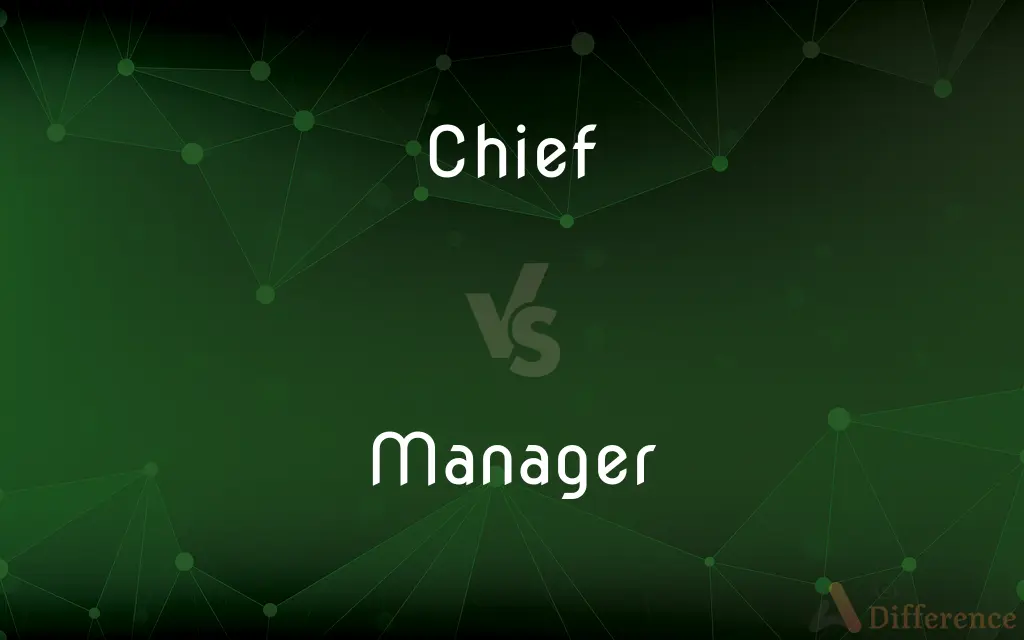Chief vs. Manager — What's the Difference?
By Urooj Arif & Fiza Rafique — Updated on March 12, 2024
A chief is a high-ranking or leading individual in an organization, often part of the executive team, while a manager oversees specific departments, projects, or teams, focusing on day-to-day operations and personnel management.

Difference Between Chief and Manager
Table of Contents
ADVERTISEMENT
Key Differences
The role of a chief, often seen in titles like Chief Executive Officer (CEO) or Chief Financial Officer (CFO), encompasses broad strategic oversight and decision-making authority within an organization. Chiefs are typically responsible for setting long-term goals, defining company policy, and ensuring the overall success and direction of the business. On the other hand, managers are more directly involved with implementing these strategies on a day-to-day basis, managing teams, overseeing projects, and ensuring operational efficiency within their specific areas of responsibility.
Chiefs often have a more holistic view of the organization, focusing on its growth, sustainability, and external relationships, including with shareholders, the public, and other stakeholders. They are key figures in shaping the company's culture, values, and ethical standards. Conversely, managers are tasked with aligning their teams and projects with these broader objectives, translating strategic goals into actionable plans, and managing resources effectively to achieve these ends.
In terms of hierarchy, chiefs typically occupy the top tier of an organization's structure and have a significant influence on its direction and policies. They are involved in high-level decisions and have a considerable impact on the company's long-term vision. Managers, while also holding leadership roles, operate at a level closer to the workforce, directly supervising staff, handling day-to-day administrative tasks, and addressing immediate operational challenges.
The path to becoming a chief often involves extensive experience within the industry, a strong track record of leadership and strategic decision-making, and frequently, advanced educational qualifications. Managers, while also benefiting from industry experience and leadership skills, may rise through the ranks based on their ability to effectively lead teams, manage projects, and contribute to their department's success.
Both chiefs and managers play crucial roles in an organization's success, but their focuses, responsibilities, and scopes of influence differ significantly. Chiefs steer the organization towards its future, while managers are key to its daily operations and the realization of its strategic goals.
ADVERTISEMENT
Comparison Chart
Role
Strategic oversight, broad decision-making
Direct oversight of teams, operational management
Focus
Long-term goals, company policy, external relationships
Day-to-day operations, team management, project oversight
Hierarchy
Top-tier executive
Middle management, departmental leadership
Responsibilities
Setting company direction, defining values and culture
Implementing strategies, managing resources, ensuring operational efficiency
Influence
High-level decisions, organizational vision
Team productivity, immediate operational issues
Path to Role
Extensive industry experience, leadership, advanced education
Leadership skills, operational expertise, project success
Compare with Definitions
Chief
High-ranking executive with broad organizational responsibilities.
As the CEO, she set the strategic direction for the entire company.
Manager
Oversees specific departments, projects, or teams.
The project manager successfully led the development of a new software product.
Chief
Engages with external stakeholders and shapes company culture.
The Chief Marketing Officer represented the company at international forums to enhance its brand image.
Manager
Translates strategic goals into actionable plans.
The marketing manager devised a campaign aligned with the company's strategic growth objectives.
Chief
Focuses on setting long-term goals and policies.
The Chief Financial Officer devised a new investment strategy to fuel growth.
Manager
Focuses on day-to-day operations and personnel management.
The sales manager implemented daily briefings to boost the team's performance.
Chief
Involved in defining the company's ethical standards and values.
The Chief Operating Officer introduced sustainability initiatives aligning with the company's values.
Manager
Directly supervises staff and manages resources.
The HR manager optimized the recruitment process to attract top talent efficiently.
Chief
Key figure in organizational leadership and decision-making.
The Chief Technology Officer led the digital transformation strategy, placing the company ahead in innovation.
Manager
Addresses immediate operational challenges.
The facilities manager quickly resolved an unexpected building maintenance issue to prevent work disruptions.
Chief
A leader or ruler of a people or clan
Chief Banawi
The chief of the village
Manager
One who directs a business or other enterprise.
Chief
An ordinary consisting of a broad horizontal band across the top of the shield.
Manager
One who controls resources and expenditures, as of a household.
Chief
Most important
Chief among her concerns is working alone at night
The chief reason for the spending cuts
Manager
One who is in charge of the business affairs of an entertainer.
Chief
One who is highest in rank or authority; a leader.
Manager
One who is in charge of the training and performance of an athlete or team.
Chief
A chief petty officer.
Manager
A student who is in charge of the equipment and records of a school or college team.
Chief
(Nautical) The chief engineer of a ship.
Manager
(management) A person whose job is to manage something, such as a business, a restaurant, or a sports team.
Chief
(Slang) A supervisor; a boss.
Manager
The head coach.
Chief
(Heraldry) The upper section of a shield.
Manager
(music) An administrator, for a singer or group. en
Chief
Highest in rank, authority, or office
The chief scientist in the lab.
Manager
(software) A window or application whose purpose is to give the user the control over some aspect of the system.
Chief
Most important or influential
The chief ingredients in the stew. See Usage Note at absolute.
Manager
One who manages; a conductor or director; as, the manager of a theater.
A skillful manager of the rabble.
Chief
A leader or head of a group of people, organisation, etc.
All firefighters report to the fire chief.
Manager
A person who conducts business or household affairs with economy and frugality; a good economist.
A prince of great aspiring thoughts; in the main, a manager of his treasure.
Chief
(heraldry) The top part of a shield or escutcheon; more specifically, an ordinary consisting of the upper part of the field cut off by a horizontal line, generally occupying the top third.
Manager
A contriver; an intriguer.
Chief
The principal part or top of anything.
Manager
Someone who controls resources and expenditures
Chief
An informal term of address.
Manager
(sports) someone in charge of training an athlete or a team
Chief
An informal term of address for a Native American or First Nations man.
Chief
Primary; principal.
Negligence was the chief cause of the disaster.
Chief
(Scotland) Intimate, friendly.
Chief
To smoke cannabis.
Chief
The head or leader of any body of men; a commander, as of an army; a head man, as of a tribe, clan, or family; a person in authority who directs the work of others; the principal actor or agent.
Chief
The principal part; the most valuable portion.
The chief of the things which should be utterly destroyed.
Chief
The upper third part of the field. It is supposed to be composed of the dexter, sinister, and middle chiefs.
Chief
Highest in office or rank; principal; head.
Chief
Principal or most eminent in any quality or action; most distinguished; having most influence; taking the lead; most important; as, the chief topic of conversation; the chief interest of man.
Chief
Very intimate, near, or close.
A whisperer separateth chief friends.
Chief
A person who is in charge;
The head of the whole operation
Chief
A person who exercises control over workers;
If you want to leave early you have to ask the foreman
Chief
Most important element;
The chief aim of living
The main doors were of solid glass
The principal rivers of America
The principal example
Policemen were primary targets
Common Curiosities
Can a manager become a chief?
Yes, a manager can become a chief through demonstrated leadership, strategic vision, and significant contributions to organizational success.
How do the responsibilities of a chief differ from those of a manager in a crisis?
In a crisis, a chief would focus on strategic responses and external communications, while a manager would handle the immediate operational impact and team coordination.
Do chiefs need managerial experience?
Yes, managerial experience is often essential for chiefs as it provides a practical understanding of organizational operations, team leadership, and problem-solving.
How do chiefs and managers contribute to company culture?
Chiefs define and embody the company's values and culture at a strategic level, while managers reinforce this culture through daily practices and team leadership.
Do chiefs interact with employees as managers do?
Chiefs may have less direct interaction with individual employees compared to managers, focusing instead on high-level strategy and organizational direction.
Are all chiefs part of the board of directors?
Not all chiefs are board members, but they often report to the board and participate in board meetings to provide insights and updates on company performance.
Is the role of a chief more challenging than that of a manager?
The roles are challenging in different ways; chiefs face the pressure of steering the organization at a macro level, while managers tackle the complexities of day-to-day operations.
Can small businesses have chiefs and managers?
Yes, small businesses can have both chiefs and managers, although the roles may be less defined or encompass broader responsibilities due to the smaller size of the organization.
How do chiefs and managers collaborate?
Chiefs and managers collaborate by aligning strategic goals with operational execution, with chiefs providing direction and managers ensuring its implementation.
How important is communication between chiefs and managers?
Communication is crucial for ensuring that strategic objectives set by chiefs are understood and effectively implemented by managers at the operational level.
Share Your Discovery

Previous Comparison
Bob vs. Nob
Next Comparison
Cowslip vs. OxlipAuthor Spotlight
Written by
Urooj ArifUrooj is a skilled content writer at Ask Difference, known for her exceptional ability to simplify complex topics into engaging and informative content. With a passion for research and a flair for clear, concise writing, she consistently delivers articles that resonate with our diverse audience.
Co-written by
Fiza RafiqueFiza Rafique is a skilled content writer at AskDifference.com, where she meticulously refines and enhances written pieces. Drawing from her vast editorial expertise, Fiza ensures clarity, accuracy, and precision in every article. Passionate about language, she continually seeks to elevate the quality of content for readers worldwide.














































